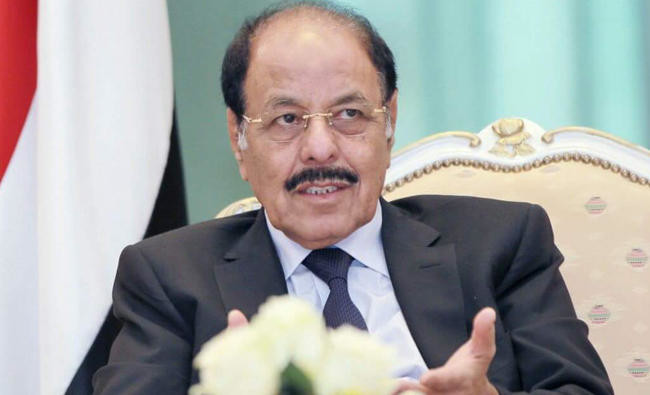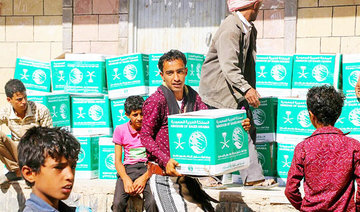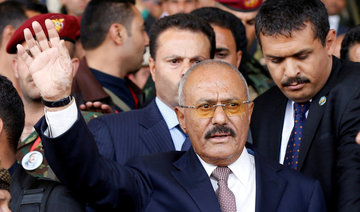ADEN: Yemeni Vice President Ali Mohsen Saleh has called for national unity to defeat the Houthi militias.
Addressing a meeting of leaders of the Nasserite Popular Unionist Party in Aden, he urged all political parties and national organizations to unite their ranks in confronting the Iran-backed Houthis, the Saudi Press Agency (SPA) reported.
He discussed the role of political parties in supporting the internationally recognized government of President Abed Rabbo Mansour Hadi.
The government — with local, regional and international support — would eventually bring an end to the turmoil created by the Houthis, Saleh said.
Military operations are aimed at stopping Houthi crimes against Yemen and its people, and building a federal state comprising six provinces in accordance with the National Dialogue Conference resolutions, he added.
A Yemeni military source said the army had liberated the areas of Haid bin Aqeel and Hajjar-Kahlan as it advances toward Wadi Khar next to Al-Baidah province, the SPA reported.
The source said the army had seized weaponry and ammunition left behind by fleeing militias.
The army’s engineering teams have begun clearing mines and explosives in the liberated areas in the Behan region of Shabwa province.
Abdul Raqib Fatah, Yemen’s local administration minister and head of the Higher Committee for Relief, said many displaced residents of Sanaa and neighboring provinces occupied by the Houthis had fled to government-controlled areas due to the militias’ brutality.
He renewed the government’s request for UN relief and humanitarian organizations to move to Aden so they can continue their work without Houthi interference and under international standards and protocols.
Houthi interference in relief operations is preventing humanitarian aid from reaching the needy, Fatah said.
Yemen VP urges national unity against Houthis
Yemen VP urges national unity against Houthis

Large drop in number of aid trucks entering Gaza on Friday

- The influx of aid this week compares with just 2,892 aid trucks entering Gaza for the whole of December, according to data from the UN Palestinian relief agency UNRWA
UNITED NATIONS: More than 4,200 aid trucks have entered the Gaza Strip in the six days since a ceasefire began between Israel and Palestinian militants Hamas, the United Nations said, although there was a large drop in the number of loads delivered on Friday.
The UN Office for the Coordination of Humanitarian Affairs (OCHA) said 339 aid trucks crossed into Gaza on Friday, citing information from Israeli authorities and the guarantors for the ceasefire agreement — the United States, Egypt and Qatar.
This compares with 630 on Sunday, 915 on Monday, 897 on Tuesday, 808 on Wednesday, and 653 on Thursday.
The truce deal requires at least 600 truckloads of aid to enter Gaza each day of the initial six-week ceasefire, including 50 carrying fuel. Half of those trucks are supposed to go to Gaza’s north, where experts have warned famine is imminent.
When asked why there was a large drop in the number of aid trucks on Friday, OCHA spokesperson Eri Kaneko said the UN and humanitarian partners “have been working as quickly as possible to dispatch and distribute this large volume of assistance” to some 2.1 million people across the devastated enclave.
The influx of aid this week compares with just 2,892 aid trucks entering Gaza for the whole of December, according to data from the UN Palestinian relief agency UNRWA.
Aid is dropped off on the Gaza side of the border, where it is picked up by the UN and distributed. Data from OCHA shows 2,230 aid truckloads — an average of 72 a day — were then picked up in December.
Throughout the 15-month war, the UN has described its humanitarian operation as opportunistic — facing problems with Israel’s military operation, access restrictions by Israel, and more recently looting by armed gangs.
The UN has said that there has been no apparent major law-and-order issues since the ceasefire came into effect.
“We are also scaling up the broader response, including by providing protection assistance, education activities and other essential support,” Kaneko said.
Gaza aid surge having an impact but challenges remain

- In the final months before the ceasefire, the few aid convoys that managed to reach central and northern Gaza were routinely looted
- Over the past week, UN officials have reported "minor incidents of looting"
JERUSALEM: Hundreds of truckloads of aid have entered Gaza since the Israel-Hamas ceasefire began last weekend, but its distribution inside the devastated territory remains an enormous challenge.
The destruction of the infrastructure that previously processed deliveries and the collapse of the structures that used to maintain law and order make the safe delivery of aid to the territory's 2.4 million people a logistical and security nightmare.
In the final months before the ceasefire, the few aid convoys that managed to reach central and northern Gaza were routinely looted, either by desperate civilians or by criminal gangs.
Over the past week, UN officials have reported "minor incidents of looting" but they say they are hopeful that these will cease once the aid surge has worked its way through.
In Rafah, in the far south of Gaza, an AFP cameraman filmed two aid trucks passing down a dirt road lined with bombed out buildings.
At the first sight of the dust cloud kicked up by the convoy, residents began running after it.
Some jumped onto the truck's rear platforms and cut through the packaging to reach the food parcels inside.
UN humanitarian coordinator for the Middle East Muhannad Hadi said: "It's not organised crime. Some kids jump on some trucks trying to take food baskets.
"Hopefully, within a few days, this will all disappear, once the people of Gaza realise that we will have aid enough for everybody."
central Gaza, residents said the aid surge was beginning to have an effect.
"Prices are affordable now," said Hani Abu al-Qambaz, a shopkeeper in Deir el-Balah. For 10 shekels ($2.80), "I can buy a bag of food for my son and I'm happy."
The Gaza spokesperson of the Fatah movement of Palestinian president Mahmud Abbas said that while the humanitarian situation remained "alarming", some food items had become available again.
The needs are enormous, though, particularly in the north, and it may take longer for the aid surge to have an impact in all parts of the territory.
In the hunger-stricken makeshift shelters set up in former schools, bombed-out houses and cemeteries, hundreds of thousands lack even plastic sheeting to protect themselves from winter rains and biting winds, aid workers say.
In northern Gaza, where Israel kept up a major operation right up to the eve of the ceasefire, tens of thousands had had no access to deliveries of food or drinking water for weeks before the ceasefire.
With Hamas's leadership largely eliminated by Israel during the war, Gaza also lacks any political authority for aid agencies to work with.
In recent days, Hamas fighters have begun to resurface on Gaza's streets. But the authority of the Islamist group which ruled the territory for nearly two decades has been severely dented, and no alternative administration is waiting in the wings.
That problem is likely to get worse over the coming week, as Israeli legislation targeting the lead UN aid agency in Gaza takes effect.
Despite repeated pleas from the international community for a rethink, the UN Relief and Works Agency for Palestine Refugees (UNRWA), which has been coordinating aid deliveries into Gaza for decades, will be effectively barred from operating from Tuesday.
UNRWA spokesman Jonathan Fowler warned the effect would be "catastrophic" as other UN agencies lacked the staff and experience on the ground to replace it.
British Foreign Secretary David Lammy warned last week that the Israeli legislation risked undermining the fledgling ceasefire.
Brussels-based think tank the International Crisis Group said the Israeli legislation amounted to "robbing Gaza's residents of their most capable aid provider, with no clear alternative".
Israel claims that a dozen UNRWA employees were involved in the October 2023 attack by Hamas gunmen, which started the Gaza war.
A series of probes, including one led by France's former foreign minister Catherine Colonna, found some "neutrality related issues" at UNRWA but stressed Israel had not provided evidence for its chief allegations.
Israel UN envoy formally calls on UNRWA to vacate Jerusalem premises

- Israel UN envoy formally calls on UNRWA to vacate Jerusalem premises
- UNRWA chief Philippe Lazzarini warns against ‘blatant disregard of international humanitarian law’
NEW YORK: Israel’s Permanent Representative to the UN Danny Danon on Friday called on the UN relief agency for Palestine refugees to halt its operations in Jerusalem, and evacuate its premises in the city “no later than Jan. 30,” the day an Israeli ban on the organization is due to take effect.
Legislation blocking UNRWA from operating within Israel was approved overwhelmingly by the Knesset in October. The ban also prevents the country’s authorities from maintaining any contact with the relief agency.
Delivery of aid to Gaza and the West Bank requires close coordination between UNRWA and Israeli authorities. If the legislation is implemented as planned, Israel will no longer issue agency staff with work or entry permits, and coordination with the Israeli military that is essential for ensuring safe passage for aid deliveries will no longer be possible.
Since the start of the war in Gaza, Israel has relentlessly condemned and attacked the aid agency. More than 260 of its staff have been killed, while its schools — used by displaced Palestinians for shelter — have been bombed. A coordinated Israeli media campaign has attempted to discredit the agency by portraying it as a tool of Hamas.
As the date for enforcement of the Israeli ban approaches, Danon told UN Secretary-General Antonio Guterres that UNRWA’s premises in Jerusalem must be vacated as stipulated by law.
The Israeli envoy said that the legislation came “as a direct response to the acute national security risks posed by the widespread infiltration of UNRWA’s ranks by Hamas and other terrorist organizations, and the agency’s persistent refusal to address the very grave and material concerns raised by Israel, and to remedy this intolerable situation.”
He added: “Months of good-faith engagement with the United Nations, and years of related grievances conveyed to UNRWA, have been met with blatant disregard, compromising its fundamental obligation to impartiality and neutrality beyond repair.”
Most UN member states consider UNRWA, the largest aid agency for Palestinians, to be the irreplaceable backbone of humanitarian operations. However, few levers have been pulled to try to ensure the agency’s existence.
Asked by Arab News about this discrepancy between public statements of support and meaningful action, and whether it means Western countries are undermining the same multilateral values on which they were founded, UNRWA Commissioner-General Philippe Lazzarini said: “The same question could be asked about the importance of international humanitarian law and the blatant and constant disregard of that law.
“You can ask the same question about the disrespect for the resolutions of the Security Council and the General Assembly. And you can ask the same question about the International Court of Justice’s ruling that Israel’s presence in the West Bank and East Jerusalem is illegal, and the court’s call for its withdrawal.
“And so, it’s obviously frustrating,” Lazzarini added. “What we have witnessed is an extraordinary ‘crisis of impunity,’ to the extent that international humanitarian law is almost becoming irrelevant if no mechanism is put in place to address this impunity.”
Hamas buries 2 leaders slain in Israel strike in Gaza months ago

- Hundreds of people attended the funerals of Rauhi Mushtaha and Sami Mohammad Odeh during Friday prayers
- The bodies, draped in the green flag of Hamas, were carried on stretchers from the mosque
GAZA CITY: Two senior Hamas members, whom Israel said it had killed months ago, were buried in Gaza on Friday after their remains were discovered under rubble during the truce, AFP journalists reported.
Hundreds of people attended the funerals of Rauhi Mushtaha and Sami Mohammad Odeh during Friday prayers in the courtyard of the Omari mosque, a historic landmark in the heart of Gaza City that has been heavily damaged by Israeli bombing.
The bodies, draped in the green flag of Hamas, were carried on stretchers from the mosque to their burial site, accompanied by around 16 masked members of the Ezzedine Al-Qassam Brigades, the armed wing of the Palestinian Islamist group.
The Israeli army announced in early October that it had “eliminated” Mushtaha and Odeh along with another Hamas leader “about three months earlier” during an air strike in the Gaza Strip.
Mushtaha, designated an “international terrorist” by the United States in 2015, was a member of Hamas’s political bureau in Gaza, responsible for finances.
Odeh was the head of Hamas’s internal security agency.
Hamas officially acknowledged their deaths in a statement on Sunday, saying that they had fallen as “martyrs.”
ADNOC shipping rules out quick return to Red Sea, CEO says

- Danish shipping company Maersk said on Friday it would continue to reroute around Africa via the Cape of Good Hope until safe passage through the Red Sea and Gulf of Aden area was ensured for the longer term
DUBAI: Red Sea shipping remains risky despite the Gaza ceasefire and an announcement by Houthis to limit attacks, according to the CEO of Abu Dhabi National Oil Company’s logistics and shipping arm.
Shipping executives remain cautious about a return to the Red Sea, given the risk to seafarers, cargo, and their assets.
Houthis have carried out more than 100 attacks on ships since November 2023, resulting in most shipping companies diverting vessels away from the Suez Canal to use the longer route around southern Africa instead.
“As we speak today, we cannot say it’s almost completely gone, and it’s a go-ahead for all the fleet to go inside the Red Sea. As I said, there is a people side to it, so we cannot risk our people going there while there may be a fragile ceasefire now,” said ADNOC Logistics & Services CEO Abdulkareem Al-Masabi.
Danish shipping company Maersk said on Friday it would continue to reroute around Africa via the Cape of Good Hope until safe passage through the Red Sea and Gulf of Aden area was ensured for the longer term.
The Houthis will limit their attacks on commercial vessels to Israel-linked ships provided the Gaza ceasefire is fully implemented.
However, they have conditioned their halt in attacks on US or UK-linked shipping with various provisos, which has added to caution on any return, shipping and insurance sources say.
The Houthis on Wednesday freed the crew of the Galaxy Leader, a vessel that the militia seized more than a year ago.
In another development, the UN has suspended all travel into areas held by Houthis after the militia detained more of their staff.
The Houthis have already detained UN staffers, as well as individuals associated with the once-open US Embassy in Sanaa and aid groups.
“Yesterday, the de facto authorities in Sanaa detained additional UN personnel working in areas under their control,” the UN statement read.
“To ensure the security and safety of all its staff, the United Nations has suspended all official movements into and within areas under the de facto authorities’ control.”
Before Friday, the UN had a total of 16 Yemeni staff in Houthi detention.
Staffers were trying to get a headcount across the UN agencies working in the country and had halted their work, which provides food, medicine, and other aid to the impoverished nation.
In June, the UN acknowledged the Houthis detained 11 Yemeni employees under unclear circumstances as the militia increasingly cracked down on areas under their control.
Several dozen others from aid agencies and other organizations are also held.
The UN added that it was “actively engaging with senior representatives” of the Houthis.





















